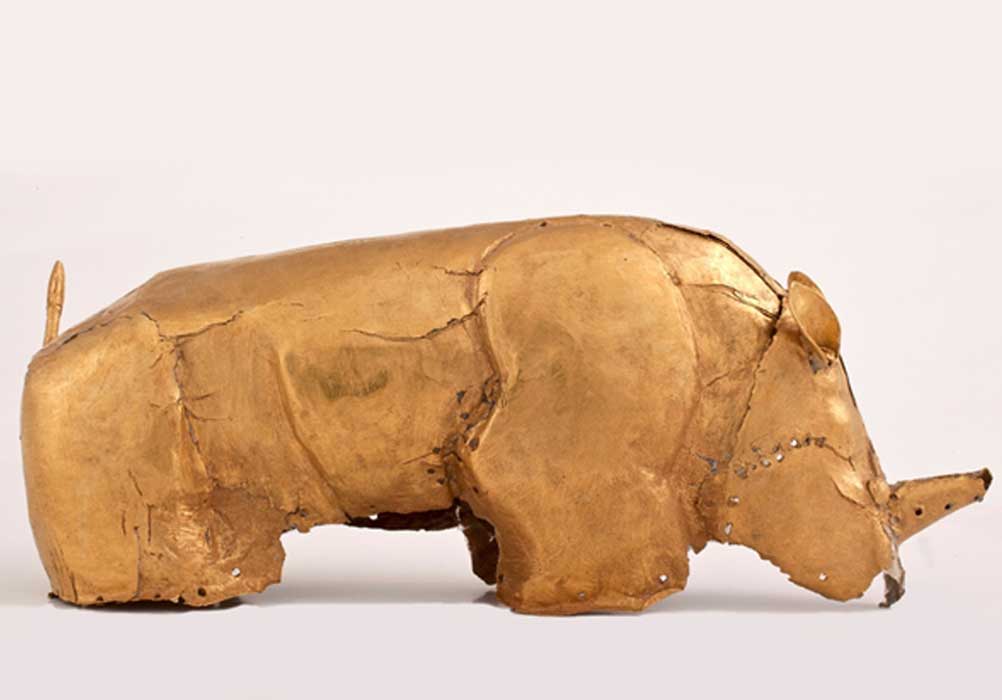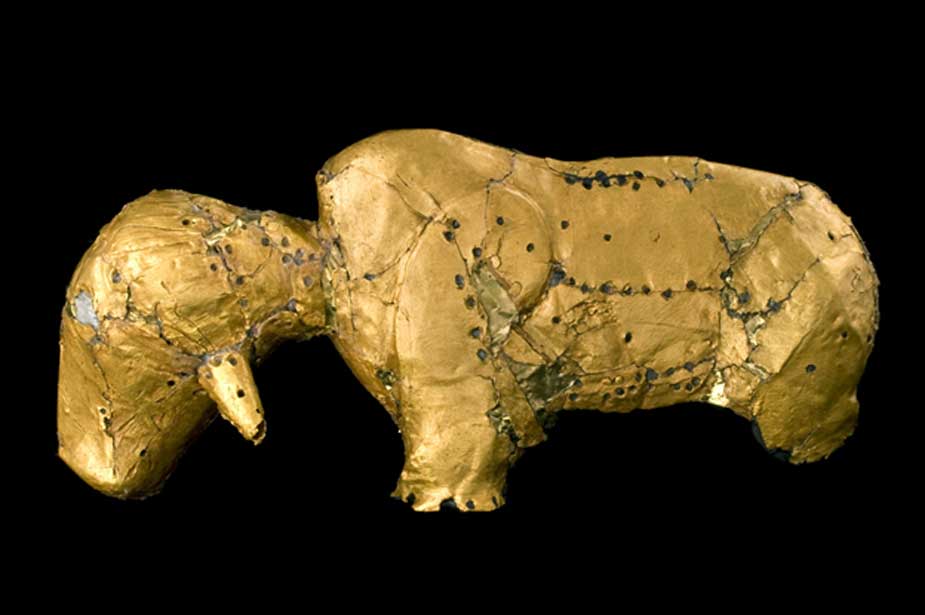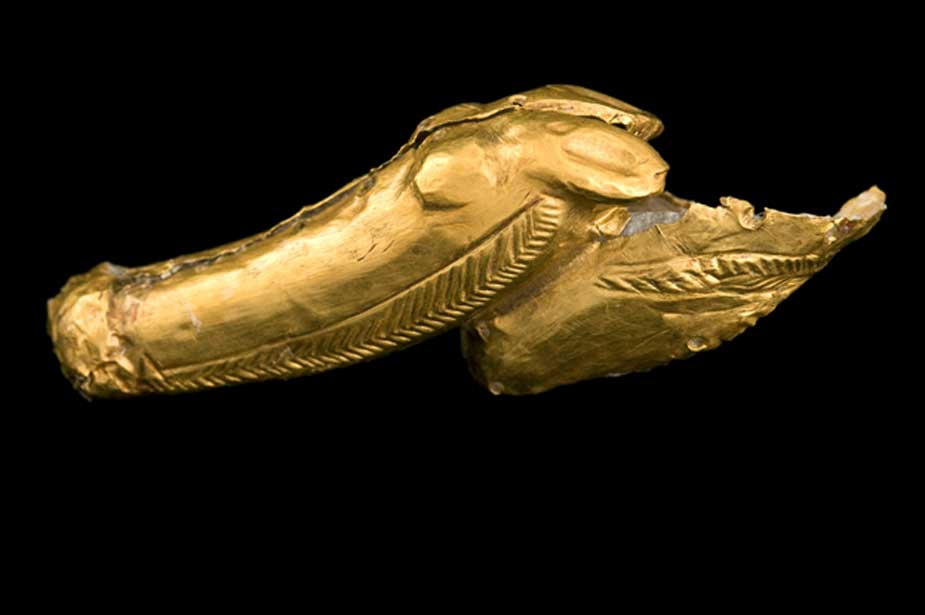
South Africa’s National Gold Treasures Just Got Rarer
Gold has been prominent in human thought and history for over 6,000 years. Considered by some, to be one of earth’s rarest and most valued precious metals, it has gained a peculiar, and indeed, an inimitable place in human history. From time immemorial, the color of gold and its enduring qualities as a precious metal, have appealed to human nature throughout ancient times to the present. However, there is much more to gold than simply color and shiny luster. Gold remains what it has always been, a substance which is precious because it is rare and in this case, archaeologically unique.

Gold bovine figurine from the Mapungubwe Collection (CC Department of UP Arts, University of Pretoria)
Rarity of Archaeological Gold
Although today gold is surprisingly found in large quantities in South Africa, archaeological gold is truly a rarity. This unique precious metal has always been avidly sought, skillfully worked and jealously guarded by those who made it, those who valued it, centuries later by those who excavated it and today those who protect it. The Mapungubwe archaeological gold collection is famously known for the scientific discovery in 1933 of a small gold rhinoceros figurine, presumably one of the most important archaeological artifacts ever discovered in South Africa and as a result uncovering southern Africa’s first known state or kingdom (1220 – 1290 AD). This now famous gold figurine together with a multitude of other gold foil forms such as a gold specter, gold bovine and a gold vessel, as well as an array of jewelry in the form of gold beads, anklets and bangles, constitute the largest gold assemblage to South African archaeology.
Grand Theft of Thulamela Gold
The second largest archaeological gold collection was found more recently in 1997, at a site known as Thulamela that was occupied around the 1400 to 1700 AD. A midden area of the site yielded gold beads as well as two royal burials excavated contained gold beads, gold necklaces, gold wire, a gold bracelet, several gold foil fragments and gold droplets. Sadly, widely reported in the media, this archaeological gold collection was stolen from the public exhibition from the Stevenson-Hamilton Knowledge Resource Centre & Museum in Skukuza in the Kruger National Park, a museum under the jurisdiction of South African National Parks. The loss of this unique heritage is a major setback for South African archaeology. Experts are calling this theft, ‘colossal’, ‘a travesty’ and a ‘serious security breach’, and leading the call for endangered heritage is Jacques Stoltz, a heritage activist and co-founder of the Heritage Monitoring Project who joined the cacophony of professionals as well as newspaper sources that first exposed the theft of the Thulamela Gold Collection to the public’s attention. The case remains unresolved and there has been no proper accountability from authorities, who are stunningly silent on the subject, but the loss remains incalculably significant. Thulamela unlike Mapungubwe, did not receive the scientific attention or acclaim it really deserved.
- Ten Spectacular Golden Treasures of the Ancient World
- Ancient Trade Route reveals Prehistoric Inhabitants of Ireland preferred Exotic Gold
- ‘Gold and the Gods’ opens window to rulers of ancient Nubia
Safeguarding the Mapungubwe Gold Collection
Consequently, Mapungubwe now remains South Africa’s only archaeological gold collection of its kind and as a result it needs to be safeguarded and protected more than ever before. Like the rest of the world, and across the African continent, South Africa is not immune to the plunder and pillage of its heritage. Some of the most valuable heritage sites and significant artifacts are being stolen, damaged, destroyed and neglected due to a lack of resources and lack of responsibility towards adequate care, preservation and protection of archaeological heritage. Mapungubwe as a subject has become synonymous with discussions about pre-colonial heritage, to the extent it is not only a national treasure, but also a national heritage site, a world heritage site and it is also borrowed its name to South Africa’s highest symbolic honor, the prestigious Order of Mapungubwe. The national and international significance of Mapungubwe remains undisputable and the uniqueness and rarity distinguish this remarkable archaeological gold collection.

Fragment of gold foil figure (CC Department of UP Arts, University of Pretoria)
The lure of Mapungubwe gold has been closely linked with the economics of power, beyond jewelry for decoration and adornment, as it strongly symbolizes high social status, as well as political wealth and authority. Between 1220 and 1290 AD, gold was mined, smithed and smelted as personal or symbols of power and prestige for royalty inhabiting Mapungubwe Hill. Jewelry such as gold beads, necklaces, bracelets and anklets were fashioned for decoration and ornamental purposes. Ceremonial and ritual objects made from thin gold foil were formed into animal figurines such as the gold rhino, and gold cattle as well as gold foil shaped into a gold bowl, scepter and other decorative or ornamental forms. At Mapungubwe, gold was sanctioned, reserved and ruled over exclusively by the elite of society whose social and political status was expressed in daily life as it was in death.
Gold artifacts adorned three royal burials on the summit of Mapungubwe Hill, where they lay undisturbed for centuries. Eventually, archaeological enquiry in the early 1930s brought to light the Mapungubwe gold collection, as well as the associated assemblages of other artifacts such as trade glass beads, shell, ceramics, clay figurines, iron and copper implements and many other archaeological finds important to the pre-coloniality of southern Africa in the 13th century.




